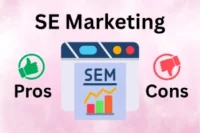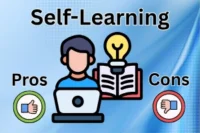Advantages & Disadvantages of Having a Website
Published: 21 Aug 2025
Did you know that over 1.9 billion websites exist today? That’s right, the internet is practically booming with information, businesses, and communities, all accessible with a few clicks.
But have you ever stopped to think, are websites all sunshine and rainbows, or are there potential drawbacks as well?
In this blog post, we’ll learn the advantages and disadvantages of websites, exploring both the positive and negative impacts they can have.
Advantages of Website
Having a website is crucial for any business looking to establish a strong online presence and reach a wider audience.

Here is a list of the key benefits of having a website:
- Increased Visibility
- 24/7 Accessibility
- Expanded Market Reach
- Cost-effective Marketing
- Enhanced Customer Engagement
- Credibility and Professionalism
- Product and Service Showcasing
- Brand Identity Establishment
- Customer Feedback Collection
- Lead Generation
- Sales Facilitation
- Analytics and Insights
- Competitive Advantage
- Targeted Advertising
- Global Presence
- Customer Support
- Scalability
- Networking Opportunities
Let’s cover each advantage of website in detail.
1. Increased Visibility
Having a website makes your business easy to find online. People can search and quickly discover what you offer. It works like a digital signboard that is always open. This helps more people know your brand. In simple words, a website gives your business a bigger reach.
- More people can reach your business
- Easy to find through online search
- Builds trust with every online visitor
2. 24/7 Accessibility
A website allows people to reach your business anytime. It is not limited to working hours like a shop. Customers can view your services even at night. This makes it easy for them to connect when they want. In short, your business stays open all day, every day.
- Customers can visit anytime they want
- Business stays open without closing hours
- Easy access from anywhere, anytime
3. Expanded Market Reach
A website helps your business go beyond local customers. People from other cities or even countries can find you online. This gives you a chance to grow your customer base. More reach means more sales opportunities. In short, a website connects you with a wider audience.
- Attract customers from different locations
- Reach people outside your local area
- Expand business to global markets
4. Cost-effective Marketing
A website is one of the cheapest ways to promote your business. You don’t need to spend huge money on traditional ads. Online promotion through a website reaches more people at less cost. It also works for you all the time without extra effort. In simple words, it saves money and gives better results.
- Promote business at a lower cost
- Reach more people with less spend
- Save money compared to print ads
5. Enhanced Customer Engagement
A website makes it easier to stay connected with your customers. People can ask questions, give feedback, or read updates anytime. This two-way communication builds stronger relationships. It also helps you understand what customers really want. In short, a website keeps your audience more involved with your business.
- Customers can interact with your business
- Get feedback to improve services faster
- Share updates directly with your audience
6. Credibility and Professionalism
A website makes your business look more trustworthy. People often judge a company by its online presence. A professional website shows that you are serious about your work. It also gives customers confidence in choosing your services. In simple words, a website builds a strong and reliable image.
- Builds trust with a professional look
- Shows you are serious about business
- Creates a strong and reliable image
7. Product and Service Showcasing
A website allows you to display your products and services clearly. Customers can see details, prices, and features before making a decision. It works like an online catalog that is always available. This makes it easy for people to understand what you offer. In short, a website is the best place to present your business.
- Show products with clear details online
- Highlight services to attract customers
- Display offers anytime for more sales
8. Brand Identity Establishment
A website helps you build a strong brand image. It shows your style, values, and message to the audience. People can easily recognize and remember your business. A clear online presence makes your brand stand out from others. In short, a website creates identity and trust for your brand.
- Show brand style with clear design
- Build recognition through online presence
- Create trust with a strong identity
9. Customer Feedback Collection
A website makes it easy to collect opinions from your customers. People can share their thoughts through forms, reviews, or messages. This feedback helps you understand their needs better. It also guides you to improve your products and services. In short, customer feedback is a valuable tool for business growth.
- Collect reviews directly from customers
- Understand customer needs more clearly
- Improve services based on feedback
10. Lead Generation
A website helps in capturing new leads for your business. People can fill forms, sign up for newsletters, or request quotes easily. This way, you collect useful customer details. More leads mean more chances to convert into sales. In short, a website turns visitors into potential customers.
- Collect customer details through forms
- Turn visitors into possible buyers
- Increase chances of future sales
11. Sales Facilitation
A website makes the sales process smoother and faster. Customers can view products, compare prices, and even buy directly online. It reduces the need for physical meetings or calls. This saves time for both you and the customer. In short, a website helps close deals easily.
- Show products with prices clearly
- Allow direct purchases through website
- Save time with faster sales
12. Analytics and Insights
A website gives you data about visitor behavior. You can see how many people visit, what they view, and what they like. This information helps you make better business decisions. It also shows what marketing strategies are working. In short, analytics helps you improve and grow.
- Track visitor numbers and behavior
- Understand customer choices and interests
- Improve business with clear data
13. Competitive Advantage
A website gives you an edge over competitors without one. Customers are more likely to choose a business that is easy to find online. A modern website also shows professionalism and trust. It keeps you ahead in today’s digital market. In short, it makes your business stand out.
- Stay ahead of offline competitors
- Attract customers through strong presence
- Show professionalism with modern design
14. Targeted Advertising
A website makes your marketing more focused. You can show ads to the right audience based on their interests. This way, you spend less and get better results. Targeted ads also increase the chances of conversions. In short, your website helps you reach the right people.
- Show ads to the right audience
- Spend less for better results
- Increase conversions with focused ads
15. Global Presence
A website allows your business to go beyond local limits. People from any country can learn about what you offer. This gives you an international reach without big costs. It also opens doors to new markets. In short, your business can be seen worldwide.
- Reach customers across different countries
- Expand business without high expenses
- Build recognition in global markets
16. Customer Support
A website helps you provide better support to customers. People can check FAQs, use chat, or send messages anytime. This makes it easy to solve their problems quickly. Good support also builds customer trust and loyalty. In short, your website becomes a support system for customers.
- Answer customer questions with FAQs
- Provide quick help through live chat
- Build loyalty with better support
17. Scalability
A website grows along with your business. You can add new products, services, or features anytime. Unlike physical stores, it has no space limits. This makes it easier to expand at a lower cost. In short, a website grows as your business grows.
- Add products or services anytime
- Expand business without space limits
- Grow easily at a low cost
18. Networking Opportunities
A website opens doors for new connections. Other businesses can find and collaborate with you online. It also helps you build partnerships that support growth. Networking brings more exposure and business opportunities. In short, your website connects you with the right people.
- Connect with other businesses online
- Build partnerships for future growth
- Gain exposure through strong networks
Disadvantages of Website
Despite the many advantages, websites also have some drawbacks that businesses need to be aware of. Understanding these disadvantages can help in making informed decisions about the online presence of a business.

Here is a list of the potential drawbacks:
- Technical Issues
- Initial Cost and Maintenance
- Security Concerns
- Dependency on Internet Connectivity
- Learning Curve
- Competition
- Time-Consuming
- Content Management
- Potential for Negative Feedback
- Limited Personal Interaction
- Accessibility Challenges
- Legal and Compliance Issues
Let’s cover each disadvantage of website.
1. Technical Issues
Websites can sometimes face technical problems like slow loading or errors. These issues can make it hard for customers to use the site. If the website does not work well, people may leave quickly. Fixing technical issues also needs time and skills. In short, technical problems can affect business performance.
- Slow loading reduces customer interest
- Errors can drive visitors away
- Fixing problems requires expert help
2. Initial Cost and Maintenance
Building a professional website requires money at the start. Even after launch, it needs regular updates and care. Small businesses may find these costs difficult. Without proper maintenance, the site may become outdated. In short, websites need both investment and upkeep.
- Requires money for initial setup
- Needs updates to stay current
- Ongoing costs can be challenging
3. Security Concerns
Websites are at risk of hacking or data theft. Customer details must be kept safe at all times. If security is weak, it can damage trust. Protecting a website requires strong measures and tools. In short, online security is a serious concern.
- Risk of hacking and data theft
- Weak security reduces customer trust
- Protection needs extra tools and effort
4. Dependency on Internet Connectivity
A website depends fully on the internet to work. If someone has a weak connection, they may struggle to use it. This can reduce the number of customers who stay. In some areas, limited internet is still a problem. In short, internet issues can affect website use.
- Needs strong internet to work well
- Poor connection reduces customer access
- Limited internet cuts user reach
5. Learning Curve
Managing a website is not always easy. Owners must learn about content, design, and tools. Without proper knowledge, it can feel confusing. This may require training or hiring experts. In short, websites can take time to learn.
- Requires knowledge of digital tools
- Can be confusing for beginners
- May need expert training or support
6. Competition
Almost every business now has a website. This makes it harder to stand out from others online. Customers can easily compare prices and services. Strong competitors may take away your audience. In short, competition online is very tough.
- Many businesses fight for attention
- Customers compare services very easily
- Hard to stay unique online
7. Time-Consuming
Running a website requires regular work and updates. You must post content, check messages, and manage design. This takes time away from other tasks. Without effort, the site can quickly become outdated. In short, websites need constant time and care.
- Needs regular updates and changes
- Takes time from business tasks
- Outdated sites lose customer interest
8. Content Management
Websites need fresh and correct content to stay useful. Managing text, images, and blogs takes effort. If the content is not updated, it may mislead customers. Good content also needs planning and creativity. In short, content management can be a big challenge.
- Needs fresh content to stay relevant
- Wrong info can confuse customers
- Requires planning and creativity always
9. Potential for Negative Feedback
Websites allow customers to share reviews and comments. Sometimes these can be negative or unfair. Such feedback may harm your business image. Handling bad reviews takes patience and care. In short, negative feedback is a risk online.
- Negative reviews hurt business reputation
- Unfair comments may scare customers
- Needs effort to handle criticism
10. Limited Personal Interaction
Websites cannot fully replace face-to-face contact. Some customers prefer talking directly with people. Online communication can feel less personal. This may reduce the emotional bond with clients. In short, websites lack human touch in service.
- Less personal than face-to-face contact
- Customers may miss human connection
- Weakens emotional bond with clients
11. Accessibility Challenges
Not everyone can access websites easily. Some people may face issues with design or language. Customers with disabilities may also struggle without special features. Ignoring accessibility can reduce your audience. In short, websites must be easy for all.
- Some users face design barriers
- Disabilities may limit online access
- Poor access reduces potential customers
12. Legal and Compliance Issues
Websites must follow rules and laws online. This includes privacy policies, data protection, and copyrights. Not following them can bring fines or legal trouble. Business owners must stay updated with regulations. In short, legal compliance is a serious need.
- Must follow data protection rules
- Risk of fines for non-compliance
- Requires updates to meet new laws
Conclusion
So, in this article, we’ve explored the advantages and disadvantages of websites. From increased visibility and accessibility to potential technical issues and security concerns, websites offer a range of benefits but also come with certain drawbacks.
But, guys understanding both sides allow you to make more educated decisions regarding their internet presence. Websites play an important part in today’s digital landscape, whether they are used to reach a global audience or to navigate problems such as maintenance costs and competition.
FAQs
Here are some of the most commonly asked questions related to the pros and cons of websites:
There are many types of websites, each made for different purposes. Some common ones include informational sites, e-commerce stores, social networking platforms, and educational websites. In total, there are more than 50 types. Each type serves a unique need for users.
Creating a website comes with some challenges. It requires money for design, setup, and regular updates. Security issues like hacking can also be a risk. On top of that, there is strong competition online, and running a site often needs technical knowledge.
Having a website gives many benefits to a business. It makes your brand visible to more people and is available 24/7. A website helps you reach a wider audience and market your services at a low cost. It also builds trust, engages customers, and lets you showcase your products or services easily.
Websites are not always reliable for information. Some may contain errors, outdated details, or biased content. It is sometimes hard to check the real source behind the information. Without proper review, the accuracy of online content can be questionable.
Using websites for research has some downsides. Not all online sources are trustworthy or credible. Information can be outdated, biased, or incomplete compared to books or journals. This makes it harder to find in-depth and accurate details.
A website helps businesses reach more people online. It works like a digital shop that is open 24/7. Customers can easily learn about products and services anytime. In short, a website builds trust and supports business growth.
Websites can be protected with strong security steps. Using SSL certificates, regular software updates, and strong passwords helps keep data safe. Backups and security plugins also reduce the risk of hacking. In short, safety needs regular care and attention.

- Be Respectful
- Stay Relevant
- Stay Positive
- True Feedback
- Encourage Discussion
- Avoid Spamming
- No Fake News
- Don't Copy-Paste
- No Personal Attacks

- Be Respectful
- Stay Relevant
- Stay Positive
- True Feedback
- Encourage Discussion
- Avoid Spamming
- No Fake News
- Don't Copy-Paste
- No Personal Attacks





